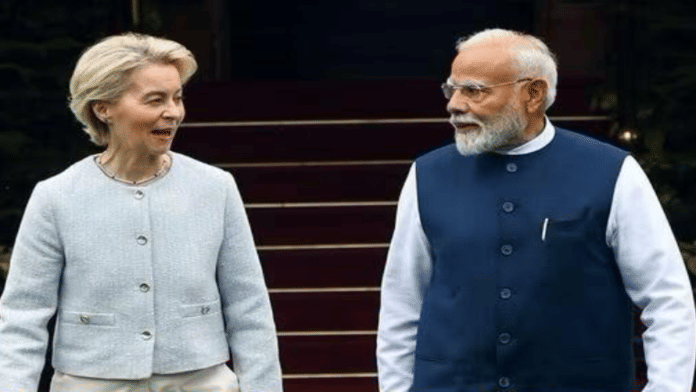Thank you dear subscribers, we are overwhelmed with your response.
Your Turn is a unique section from ThePrint featuring points of view from its subscribers. If you are a subscriber, have a point of view, please send it to us. If not, do subscribe here: https://theprint.in/
The Foreign minister of France, Jean-Noel Barrot travelled to Beijing last week to have a meeting with his counterpart, Wang Yi. The visit while focused on bilateral issues like trade must be looked in the backdrop of Ukraine peace process. At a time when the US seems dismissive of legitimate European concerns vis-a vis the Russia-Ukraine war along with countries on the eastern fringe of Europe like Georgia, Slovakia and Serbia divided between Pro-Russia and Pro-EU politics, the European Union is struggling for both unity & relevance.
European Union chief, Ursula von der Leyen was in India in February end when an unpleasant exchange between President Trump and President Zelenskyy broke out in the oval office. Most of the European leaders reaffirmed their support to Ukraine, refused to shift the blame of the war from Russia to Ukraine, and in the UK, European leaders along with Canada and Türkiye, pledged their support to Ukraine and built a ‘Coalition of the Willing’.
Subsequently and even before the Trump-Zelenskyy spat, EU decided to look inwards for developing its defence capabilities. The process obviously accelerated with Doland Trump taking over the presidency in the US. EU unveiled a 800 billion Euro plan to ‘Rearm’ Europe, France offered its Nuclear Umbrella to be extended to Europe and Germany passed a law to let go off its debt break (something similar in structure but much more effective than India’s FRBM law) to increase its defence spending. However, NATO general secretary Mark Rutte made it clear during his visit to Poland that there is no alternative to the US’s nuclear umbrella, when it comes to the defence of Europe.
In his address at the Warsaw School of Economics, the NATO general secretary highlighted European and Canadian contribution to the Trans-Atlantic alliance. He mentioned how countries like Poland, Estonia, Latvia and Lithuania are increasing their defence spending. He also alluded to how European allies responded through the Baltic Sentry when undersea infrastructure in the Baltic Sea was threatened last winter without any help from the US. He reminded that a Dutch commander leads the training and advisory mission of NATO in Iraq where the US is still conducting operations against the Islamic State.
Mark Rutte was the PM of Netherlands during Trump 1.0 and shared a great rapport with Trump even then. But while Rutte tries to hold NATO together, Europe is exploring its options. On his visit to Beijing, Barrot requested China to convince Russia to make peace proposals in good faith. This was in line with earlier Franco-China discussions where President Macron called on China to bring Russia to its senses and advised Europe against blindly following the US policy on China. France, the country with probably the highest gross national power in the EU is making it clear that Russia will be a bigger threat to Europe in the longer term than China. President Macron during his visit to the Washington in February also cautioned that US can’t have a trade war with Europe and China at the same time.
So where does all this leave India? It must be noted that while we brace the reciprocal US tariffs this week, before pursuing any noteworthy internal reform, we are looking to revoke restrictions on Chinese investments. While we target to reach a full FTA with European Union by the year end, our experience with the UK demonstrate that deadlines aren’t that helpful with FTAs. As tariffs from the US pushes both India and the EU towards China, both the US and EU, at the same time, see a role for China in resolving the Ukraine conflict which is bigger than India. China might emerge stronger both economically and strategically as an aftereffect of the Russia-Ukraine war than it probably could have if the war could have resolved earlier or had not taken place at all.
Europe has been patient with India’s stance on Russia for its own interests. It is unclear whether US will show such patience with India when it comes to confronting China. In this situation, monitoring the QUAD is crucial, and priority should be given to sustaining it for the time being through defence purchases from the US. President Trump might be great friend with all the leaders of the world as he likes to reiterate it but under him, US’s reliability as a partner is being questioned time and again. India’s stand on the Russia-Ukraine war stands vindicated as seen by most but we must also prepare for world order resulting after the conflict in Europe which will have many aspects but certainty.
These pieces are being published as they have been received – they have not been edited/fact-checked by ThePrint.


